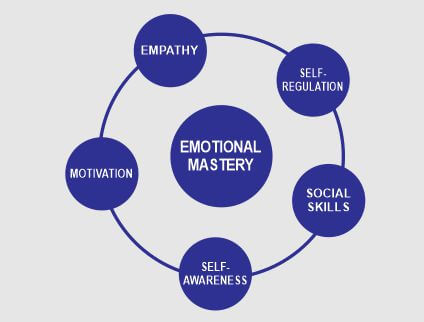Discover the power of emotional mastery and how it can help you navigate challenges, build resilience, and cultivate healthier relationships.
Emotions are an intrinsic part of the human experience, influencing our thoughts and actions, and can be channeled into self-improvement.
However, without a proper understanding of emotions, it can become overwhelming and hinder personal growth.
Emotional mastery empowers you to navigate your emotions effectively, leading to a balanced life and mastery of a more fulfilled self.
In this article, we will look closely at the concept of emotional mastery, explaining its significance, exploring techniques for achieving it, and highlighting the numerous benefits it brings.
What is Emotional Mastery?
Emotional mastery is the skill of consciously directing emotions to serve rather than disrupt your intentions.
It requires recognizing emotional triggers, processing feelings without being controlled by them, and choosing responses that align with long-term objectives.
Unlike suppression, which buries emotions, mastery involves engaging with them constructively to enhance clarity, resilience, and interpersonal effectiveness.
It is a practice of emotional agility, adapting feelings to situations rather than being overwhelmed or detached from them.
By cultivating emotional intelligence and resilience, you become better equipped to handle life’s challenges, build authentic relationships, make sound decisions, and pursue personal growth.
Related: How Emotional Awareness Sharpens Your Non-verbal Communication
Relationship between Emotional Mastery and Emotional Intelligence
The mastery of emotions and emotional intelligence is closely intertwined.
Emotional intelligence forms the foundation for mastering your emotions, covering the awareness and understanding of emotions in yourself and others.
Emotional mastery, then, builds upon this foundation by emphasizing the development of skills to effectively regulate and channel emotions.
It involves the ability to manage your own emotions constructively, leading to greater self-control, resilience, and overall well-being.
In essence, the mastery of emotions is the practical application of emotional intelligence, resulting in a heightened sense of self-awareness and the capacity to navigate complex interpersonal dynamics with grace and skill.
Related: 13 Ways to Achieve Mental Clarity
Components of Emotional Mastery

To master your emotions, you need to develop and enhance several key components as explained below:
1. Self-awareness
This refers to the ability to understand and recognize your own emotions, strengths, weaknesses, values, and motivations.
It involves being able to identify and label different emotions accurately and being aware of the impact they have on thoughts and behavior.
A lack of self-awareness will put you in constant conflict with people and
2. Self-regulation
This component involves the ability to control and manage emotions effectively.
It includes learning techniques to handle stress, regulate emotional reactions, and practice impulse control.
Self-regulation allows you to respond to situations thoughtfully and calmly, rather than reacting impulsively.
3. Empathy
Empathy is the ability to understand and share the feelings of others.
It involves being able to recognize and acknowledge the emotions of others and to respond with compassion and understanding.
Empathy allows you to build stronger relationships, enhance social connections, and effectively communicate and collaborate with others.
4. Social Skills
Social skills are the ability to build and maintain positive relationships, communicate effectively, and navigate social situations with ease.
It involves skills such as active listening, assertiveness, conflict resolution, and collaboration.
Having strong social skills enables you to establish rapport, influence others, and handle interpersonal interactions successfully.
5. Motivation
Motivation is the driving force behind your thoughts, emotions, and actions.
Having a strong sense of motivation allows you to set and work towards goals, persevere in the face of challenges, and maintain an optimistic outlook.
Motivation is closely linked to emotional mastery, as it contributes to resilience and the ability to manage emotions effectively.
The Practice of Emotional Mastery

1. Developing Self-awareness
Self-awareness forms the foundation of mastering your emotions including identifying, naming, and managing them.
It entails attentiveness to your emotions, thoughts, and physical sensations without judgment.
By routinely practicing introspection and mindfulness, you can better recognize their emotional triggers, helping you to respond rather than react impulsively.
Journaling, meditation, and self-reflection exercises can aid in sustaining self-awareness.
2. Identifying Emotional Patterns
Recognizing recurring emotional patterns helps you identify the underlying causes behind your emotions.
By discerning these patterns, you gain insights into past experiences, conditioned responses, and limiting beliefs that influence emotional reactions.
Therapy, self-help books, or seeking guidance from a mentor can facilitate this process.
3. Emotional Regulation Techniques
Mastering emotions requires tools and techniques to regulate and manage intense emotions effectively.
Deep breathing exercises, visualization, progressive muscle relaxation, and positive self-talk are some widely employed practices.
Learning to express emotions constructively through communication, art, or physical activity helps prevent emotional bottling, facilitating healthy emotional release.
4. Cultivating Empathy
Empathy plays a crucial role in the mastery of emotions, as it allows you to understand and connect with the emotions of others.
By practicing empathy, you enhance your interpersonal relationships, encouraging open communication, and deepening connections.
Active listening, perspective-taking, and seeking to understand others’ experiences are valuable practices for developing empathy.
Benefits of Emotional Mastery
1. Improved Mental Health
If you can master your emotions, you significantly boost your mental well-being.
It reduces stress, and anxiety and forms a bulwark against depression.
It enables you to develop healthy coping mechanisms and adaptability, leading to a resilient and positive outlook on life.
2. Enhanced Relationships
Mastering your emotions enhances interpersonal relationships, both personal and professional.
As you become more adept at understanding and regulating your own emotions, you become more empathetic and attuned to the emotions of others.
This promotes effective communication, deepens connections, and strengthens relationships.
3. Decision-making and Problem-solving
By mastering emotions, you can make more objective decisions and solve complex problems.
For instance, emotionally intelligent people can separate their emotional biases from analytical reasoning, resulting in more sound and rational choices.
They become less prone to impulsive actions and can navigate challenging situations with clarity and composure.
4. Personal Growth and Resilience
Mastering your emotions is key to personal growth and resilience.
Individuals who can manage their emotions are better equipped to face adversity, bounce back from setbacks, and maintain a growth mindset.
Mastery of emotions facilitates self-reflection, learning from experiences, and adopting a proactive approach to personal development.
Applying Emotional Mastery in Daily Live
Applying emotional mastery in daily life involves utilizing emotional intelligence to navigate various situations with skill and composure.
Managing Stress and Conflict
If you can have firm control and master your emotions, you recognize and regulate your emotional responses to stress and conflict, encouraging resilience and promoting constructive conflict resolution.
Effective Communication and Collaboration
By understanding and managing your own emotions, you can communicate more effectively, empathize with others, and build stronger, more collaborative relationships.
Leadership and Decision Making
The mastery of emotions empowers leaders to make well-informed, empathetic decisions, inspiring trust and a positive organizational culture.
Personal Growth and Fulfillment
Mastering your emotions helps you cultivate a deeper understanding of your motivation, leading to personal growth, self-fulfillment, and a greater sense of overall well-being.
Frequently Asked Questions
What are the benefits of emotional mastery?
The benefits of mastering emotions include improved mental well-being, enhanced relationships, increased resilience, and greater professional success.
Why is mastering your emotions helpful in life?
Mastering your emotions is helpful in life as it leads to better self-control, healthier relationships, and improved decision-making and problem-solving.
How can emotional intelligence improve your life?
Emotional intelligence can improve your life by enhancing communication, fostering empathy, promoting effective leadership, and facilitating better conflict resolution.
How to do emotional mastery?
Emotional mastery can be achieved through self-reflection, self-regulation techniques, empathy development, and motivation and goal setting.
Final Word from The Conducts of Life
Emotional mastery is a lifelong journey, requiring consistent practice, patience, and self-reflection.
By embarking on this journey, you can unlock the key to a more fulfilling life.
It enables you to harness the power of emotions and use them as valuable tools for personal growth, improved relationships, and overall well-being.
With this skill over your emotions, you can navigate life’s challenges with grace and self-assurance, paving the way for a more authentic and satisfying existence.
References:
- https://www.skillsyouneed.com/rhubarb/emotional-mastery.html
- https://thelivingwell.com/how-you-heal-emotional-mastery/
Pious Clements is the insightful voice behind "The Conducts of Life" blog, where he writes about life ethics, self-development, life mastery, and the dynamics of people and society.
With a profound understanding of human behaviuor and societal dynamics, Pious offers thought-provoking perspectives on ethical living and personal growth.
Through engaging narratives and astute observations, he inspires readers to navigate life's complexities with wisdom and integrity, encouraging a deeper understanding of the human experience and our place within society.
